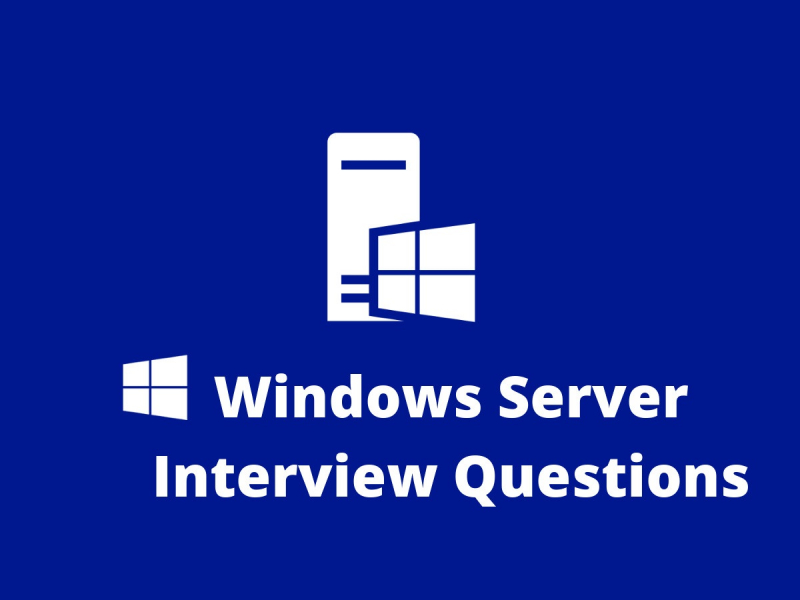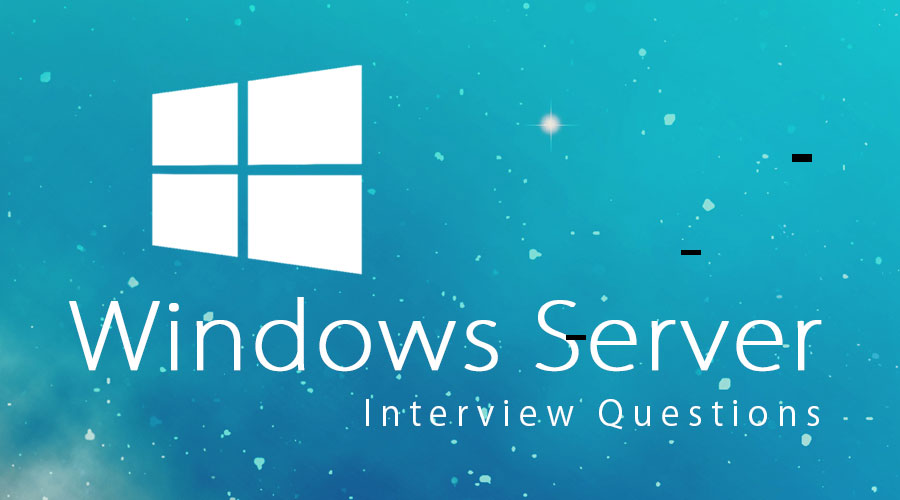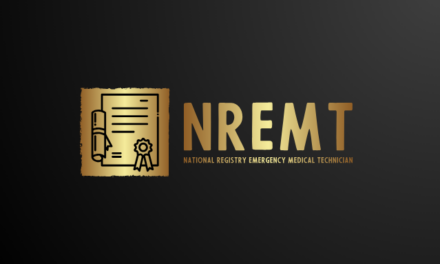How To Pass Top 65 Windows Server Interview Questions?
Are you looking to land a job as a Windows Server specialist? Congratulations on taking the first step in your journey! Passing an interview is one of the most important steps in the hiring process, and the right preparation is key. To help you prepare and gain the confidence you need to nail your interview, we have compiled a list of the top 65 Windows Server interview Linux server troubleshooting interview questions and answers. This guide will provide you with the best tips and strategies to help you answer each question with ease. So, take a deep breath and get ready to ace your Windows Server interview!
How To Prepare for Windows Server Interview Questions: Top Tips & Strategies
1. Research the Role: Take the time to research the role you are interviewing for. Understand the job and the skillset required, including the expected server and infrastructure technologies. This will help you to better answer questions and give more detailed explanations.
2. Know Your Resume: Thoroughly review your resume before the interview. Ensure that you can explain the details of each job and any technology mentioned on your resume.
3. Research Windows Server: Spend some time getting familiar with Windows Server and its features. Make sure you are familiar with the most recent version, as well as any other versions that may be used in the job.
4. Practice Interviewing: Prepare for the interview by practicing interview questions. This will help you to become comfortable answering questions and will help you to stay on track during the interview.
5. Be Prepared to Answer Specific Questions: Prepare to answer questions about your experience with deploying and managing Windows Server, troubleshooting server issues, and managing user accounts.
6. Demonstrate Your Knowledge: Use your experience and knowledge to demonstrate how you could benefit the company. Showcase your technical abilities by providing examples of how you have used Windows Server to solve problems.
7. Ask Questions: Have a few questions prepared to ask your interviewer. This will show your enthusiasm for the role and will demonstrate your interest in the company.
8. Take Notes: Bring a notepad and pen to the interview so that you can take notes. This will help you to remember important details and will help you to follow up after the interview.
9. Be Professional: Make sure to be professional during the interview. Be on time, dress appropriately, and maintain good eye contact.
What to Expect from Windows Server Interview Questions: Common Questions & Answers
1. What experience do you have with Windows Server? I have extensive experience working with Windows Server, including managing and administering servers, configuring and troubleshooting networks, and developing and deploying applications. I have also worked with the latest version of Windows Server, including Hyper-V and advanced security features.
2. What challenges have you faced while working with Windows Server? I have encountered several challenges while working with Windows Server, including hardware and software compatibility issues, configuration and administration errors, and performance optimization. In each case, I was able to troubleshoot the issue and develop an effective solution.
3. How do you stay up-to-date with the latest Windows Server technology? I stay up-to-date with the latest Windows Server technology by reading blogs and industry news, attending conferences and webinars, and networking with other IT professionals. I also make sure to keep up with the latest versions of Windows Server, including any new features or security updates.
4. What do you think is the most important skill for a Windows Server administrator? I believe the most important skill for a Windows Server administrator is problem solving. In order to troubleshoot and resolve issues quickly and effectively, administrators need to be able to think critically and identify the root cause of the problem. Additionally, administrators need to stay up-to-date on the latest technology and be willing to learn new skills.
How to Answer Advanced Windows Server Interview Questions
1. How would you go about creating a secure environment for Windows Server? When creating a secure environment for Windows Server, it is important to take a comprehensive approach. This includes implementing strong authentication methods, such as Multi-Factor Authentication, and performing regular security audits. Additionally, it is important to ensure that the latest security patches and updates are installed, and that the appropriate firewall and anti-virus/anti-malware software is in place. Taking these steps will help ensure a secure Windows Server environment.
Understanding the Most Common Windows Server Interview Questions & How To Respond
As such, it’s not surprising that Windows Server is one of the most common topics of interviews. The most common Windows Server interview questions focus on topics such as installation, configuration, management, and troubleshooting. Here are some tips on how to respond to the most common Windows Server interview questions.
1. How would you install Windows Server? This is a basic question, and a great opportunity to demonstrate your knowledge of the installation process. Explain that there are a few different approaches to installing Windows Server, such as using an ISO image, using a USB drive, or using a network installation. Give a brief overview of each and explain which method you recommend.
2. How would you configure and manage Windows Server? This question is looking for an understanding of the basic configuration and management tasks associated with Windows Server. Explain how to use the tool to add roles and features, manage users and groups, configure storage, and perform other common tasks.
3. What are some of the common troubleshooting techniques for Windows Server? This question is looking for an understanding of the common troubleshooting techniques for Windows Server. Explain that the first step is to check the event logs for errors, and then use tools such as Performance Monitor and the Task Manager to identify the source of the issue. Also explain that restarting the server and running System File Checker are two other common troubleshooting techniques. By demonstrating an in-depth understanding of the most common Windows Server interview questions, you will show potential employers that you have the skills and knowledge necessary to succeed in a Windows Server role. Keep these tips in mind as you prepare for your next interview and you will be sure to impress!
What You Need to Know About Windows Server Interview Questions & How to Ace Them
Acing Windows Server interview questions can be a daunting task. Knowing what questions to expect, and how to answer them effectively, is essential for making a good impression with potential employers.
Before the interview, it’s important to understand the core concepts and components of Windows Server. Familiarity with Windows Server roles, services, and features is essential. It’s also important to understand the basics of Active Directory, DNS, DHCP, Group Policy, and Hyper-V.

Be prepared to answer questions about networking and security, and about the installation, configuration, and troubleshooting of Windows Server. Finally, be sure to demonstrate your knowledge of the Windows Server platform by highlighting your experience and successes. Be confident and articulate in your answers, and be sure to provide relevant examples to illustrate your points. By understanding the core concepts of Windows Server, being prepared to answer a wide range of questions, and demonstrating your knowledge and experience, you can ace your Windows Server interview and land the job of your dreams.
Get Ready for Your Windows Server Interview: 65 Questions to Prepare For
Are you looking to land a job in Windows Server? Get Ready for Your Windows Server Interview: 65 Questions to Prepare For is an essential guide to help you prepare for your Windows Server interview. This comprehensive guide covers all the topics you need to know, from installation and configuration to Active Directory and Group Policy. With this guide, you’ll be able to answer any question that comes your way and demonstrate your knowledge of Windows Server. Get Ready for Your Windows Server Interview: 65 Questions to Prepare For is the perfect resource to help you ace your Windows Server interview.
Key Windows Server Interview Questions
Windows Server is a powerful and versatile platform that can be used to manage a variety of tasks, from basic file and print services to complex applications and services. As such, it is important to have a good understanding of the platform when interviewing for a Windows Server position.
When interviewing for a Windows Server position, employers will likely ask a variety of questions to gauge your knowledge and experience. Here are some of the most common Windows Server interview questions:
1. What experience do you have with Windows Server?
This question is designed to get a sense of your familiarity with the platform. Be sure to provide specific examples of projects you have worked on and tasks you have completed.
2. What Windows Server roles and features have you worked with?
This question is designed to get a sense of your experience with specific Windows Server roles and features. Be sure to provide examples of roles and features you have worked with and any challenges you faced while working with them.
3. What is your experience with Active Directory?
Active Directory is a key component of Windows Server, so employers will want to know if you have experience with it. Be sure to provide examples of projects you have worked on and tasks you have completed related to Active Directory.
4. What experience do you have with PowerShell?
PowerShell is a powerful scripting language that can be used to automate many tasks in Windows Server. Be sure to provide examples of scripts you have written and tasks you have automated using PowerShell.
5. What experience do you have with virtualization technologies?
Virtualization technologies such as Hyper-V and VMware are becoming increasingly important in Windows Server environments. Be sure to provide examples of projects you have worked on and tasks you have completed related to virtualization technologies.
6. What experience do you have with storage technologies?
Storage technologies such as SANs and NASs are important components of Windows Server environments. Be sure to provide examples of projects you have worked on and tasks you have completed related to storage technologies.
7. What experience do you have with networking technologies?
Networking technologies such as DHCP, DNS, and IP addressing are important components of Windows Server environments. Be sure to provide examples of projects you have worked on and tasks you have completed related to networking technologies.
By preparing for these common Windows Server interview questions, you can be sure to demonstrate your knowledge and experience with the platform. With the right preparation, you can be sure to make a great impression on potential employers.
Understanding Windows Server System Administration
Windows Server System Administration is the process of managing and maintaining a Windows Server operating system. It involves a wide range of tasks, from configuring and deploying the server to monitoring and troubleshooting. It also includes managing user accounts, security, performance, and network resources.
The primary goal of Windows Server System Administration is to ensure the smooth operation of the server and its applications. This includes setting up the server, configuring the server, installing and updating software, and monitoring the server’s performance.
When setting up a Windows Server, system administrators must first install the operating system. This includes configuring the server, setting up the network, and installing any necessary software. System administrators must also configure the server to meet the needs of the organization, such as setting up user accounts, setting up security policies, and configuring the server to meet the organization’s performance requirements.
Once the server is set up, system administrators must monitor the server’s performance and make sure that all applications are running smoothly. This includes monitoring the server’s resources, such as CPU, memory, and disk usage. System administrators must also ensure that the server is secure by setting up firewalls, antivirus software, and other security measures.
System administrators must also manage user accounts and ensure that users have the necessary access to the server. This includes setting up user accounts, setting up permissions, and setting up access control lists.
Finally, system administrators must troubleshoot any issues that arise with the server. This includes identifying and resolving any hardware or software issues, as well as troubleshooting any network issues. System administrators must also be able to diagnose and fix any problems that arise with the server.
Windows Server System Administration is a complex and challenging job, but it is essential for the smooth operation of any organization’s server. System administrators must have a thorough understanding of the Windows Server operating system and be able to configure, monitor, and troubleshoot the server. With the right knowledge and experience, system administrators can ensure that the server is secure, reliable, and efficient.
Preparing for a Windows Server Interview
Preparing for a Windows Server Interview can be a daunting task, but it is important to be well-prepared in order to land the job. Windows Server is a powerful and complex system, and employers will be looking for candidates who have a strong understanding of the technology. Here are some tips to help you prepare for a Windows Server Interview.
First, it is important to have a good understanding of the Windows Server architecture. This includes knowing the different components of the system, such as the operating system, Active Directory, and the various services and applications that run on it. You should also be familiar with the different roles and responsibilities of a Windows Server administrator, such as setting up and managing user accounts, configuring security settings, and troubleshooting any issues that may arise.
Second, you should be prepared to answer questions about the various features and functions of Windows Server. This includes knowing how to install and configure the system, as well as understanding how to use the various tools and applications that are available. You should also be able to explain the different security measures that are in place, such as firewalls and antivirus software.
Third, you should be familiar with the different types of hardware and software that are used in a Windows Server environment. This includes knowing the different types of servers, such as web, database, and application servers, as well as the different types of storage devices and networking equipment.
This includes any projects you have worked on, any certifications you have obtained, and any training courses you have taken. Employers will want to know how well you understand the technology and how well you can apply it in a real-world environment.
By following these tips, you can ensure that you are well-prepared for a Windows Server Interview. Be sure to practice your answers to common questions, research the company and the position, and be prepared to discuss your experience with the technology. With the right preparation, you can make a great impression and land the job.
Knowing the Basics of Windows Server
Windows Server is a powerful operating system that provides a secure and reliable platform for running applications, managing networks, and providing services to users. It is the most popular server operating system used by businesses and organizations around the world.
It is a secure, reliable, and cost-effective platform for running applications, managing networks, and providing services to users. Windows Server is a powerful platform that provides a wide range of features and capabilities, including Active Directory, DNS, DHCP, Group Policy, and Remote Desktop Services.
It provides a graphical user interface (GUI) that allows administrators to quickly and easily configure and manage the server. Windows Server also provides a command-line interface (CLI) that allows administrators to perform more advanced tasks.
Windows Server also provides a wide range of security features to protect the server and its data. It includes features such as encryption, authentication, and authorization. Windows Server also provides tools to help administrators monitor and manage the server, such as Windows Event Viewer and Windows Performance Monitor.
Windows Server is an essential part of any business or organization’s IT infrastructure. It provides a secure, reliable, and cost-effective platform for running applications, managing networks, and providing services to users. With its wide range of features and capabilities, Windows Server is the ideal choice for businesses of all sizes.
How to Ace Your Windows Server Interview
If you’re looking to land a job as a Windows Server Administrator, you’ll need to ace your interview. This is your chance to show the employer that you have the skills and knowledge to do the job. To help you prepare, here are some tips on how to ace your Windows Server interview.
1. Research the Company: Before the interview, make sure you do your research on the company. Find out what their core values are, what their mission statement is, and what their IT infrastructure looks like. This will help you understand the company’s needs and tailor your answers to their specific requirements.
2. Prepare Your Answers: Take some time to think about the questions you might be asked and prepare your answers. Think about the technical aspects of the job, such as setting up and managing Windows servers, and be prepared to explain how you would handle certain tasks.
3. Show Your Knowledge: Show the interviewer that you have a thorough understanding of Windows Server by discussing topics such as server roles, Active Directory, and other related topics. Make sure you can explain the basics of Windows Server and how it works.
4. Be Prepared to Troubleshoot: The interviewer may ask you to troubleshoot a problem with a Windows Server. Make sure you are prepared to answer questions about how you would go about troubleshooting a problem.
5. Be Confident: Make sure you come across as confident and knowledgeable. Don’t be afraid to ask questions if you don’t understand something. Show the interviewer that you are eager to learn and that you are confident in your abilities.
By following these tips, you should be well-prepared for your Windows Server interview. Remember to research the company, prepare your answers, show your knowledge, be prepared to troubleshoot, and be confident. With the right preparation, you should be able to ace your Windows Server interview and land the job.
Conclusion
No matter what kind of Windows Server interview you are preparing for, this article has given you the tools you need to succeed. With 65 questions to help you prepare, you can be confident that you have the knowledge and skills to answer any questions that come your way. Whether you are a beginner or an experienced Windows Server user, this article has given you the information you need to make sure you are ready for your Windows Server interview.




